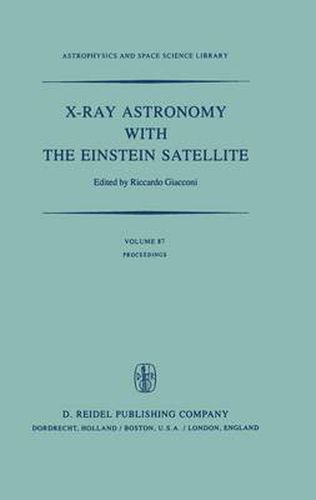Readings Newsletter
Become a Readings Member to make your shopping experience even easier.
Sign in or sign up for free!
You’re not far away from qualifying for FREE standard shipping within Australia
You’ve qualified for FREE standard shipping within Australia
The cart is loading…






This title is printed to order. This book may have been self-published. If so, we cannot guarantee the quality of the content. In the main most books will have gone through the editing process however some may not. We therefore suggest that you be aware of this before ordering this book. If in doubt check either the author or publisher’s details as we are unable to accept any returns unless they are faulty. Please contact us if you have any questions.
The meeting of the High Energy Astrophysics Division of the American Astronomical Society, held in Cambridge, Massachusetts on January 28- 30, 1980, marks the coming of age of X-ray astronomy. In the 18 years since the discovery of the first extrasolar X-ray source, Sco X-l, the field has experienced an extremely rapid instrumentation development culminating with the launch on November 13, 1978 of the Einstein Observatory (HEAO-2) which first introduced the use of high resolution imaging telescopes to the study of galactic and extragalactic X-ray sources. The Einstein Observatory instruments can detect sources as faint as 10-7 Sco X-lor about 17 magnitudes fainter. The technological developments in the field have been paralleled by a host of new discoveries: in the early 1960's the detection of 9 "X-ray stars", objects 10 times more luminous in X-rays than the Sun and among the brightest stellar objects at all wavelengths; in the late 1960's and early 1970's the discovery of the nature of such systems which were identified as collapsed stars (neutron stars and black holes) in mass exchange binary systems, and the detection of the first few extragalactic sources.
$9.00 standard shipping within Australia
FREE standard shipping within Australia for orders over $100.00
Express & International shipping calculated at checkout
This title is printed to order. This book may have been self-published. If so, we cannot guarantee the quality of the content. In the main most books will have gone through the editing process however some may not. We therefore suggest that you be aware of this before ordering this book. If in doubt check either the author or publisher’s details as we are unable to accept any returns unless they are faulty. Please contact us if you have any questions.
The meeting of the High Energy Astrophysics Division of the American Astronomical Society, held in Cambridge, Massachusetts on January 28- 30, 1980, marks the coming of age of X-ray astronomy. In the 18 years since the discovery of the first extrasolar X-ray source, Sco X-l, the field has experienced an extremely rapid instrumentation development culminating with the launch on November 13, 1978 of the Einstein Observatory (HEAO-2) which first introduced the use of high resolution imaging telescopes to the study of galactic and extragalactic X-ray sources. The Einstein Observatory instruments can detect sources as faint as 10-7 Sco X-lor about 17 magnitudes fainter. The technological developments in the field have been paralleled by a host of new discoveries: in the early 1960's the detection of 9 "X-ray stars", objects 10 times more luminous in X-rays than the Sun and among the brightest stellar objects at all wavelengths; in the late 1960's and early 1970's the discovery of the nature of such systems which were identified as collapsed stars (neutron stars and black holes) in mass exchange binary systems, and the detection of the first few extragalactic sources.